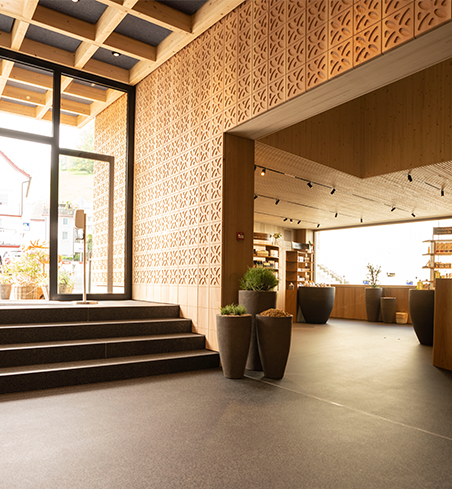Interview with Dr Christel Adomat, JUST Head of Product Innovation

“No chemist, no matter how well trained, could produce the variety and complexity of active ingredients in the laboratory that we find in plants. That is why the intact environment with its plant diversity is indispensable for the company’s continued existence”
Christel Adomat, JUST Head of Product Innovation – F&E
What does sustainability mean to you? How do you define sustainability?
In my view we act sustainably when we treat the environment and its resources with care and appreciation. We all want to satisfy our needs today and also in the future, but we also want to be able to live in an environment with clean air and clean water, and to be treated with respect ourselves, irrespective of whether we live in Switzerland, Argentina or Malaysia.
Where does sustainability begin and where does it end?
In my view we act sustainably when we treat the environment and its resources with care and appreciation. We all want to satisfy our needs today and also in the future, but we also want to be able to live in an environment with clean air and clean water, and to be treated with respect ourselves, irrespective of whether we live in Switzerland, Argentina or Malaysia.
What can we all learn from plants in terms of sustainability?
An incredible amount. Plants are experts in sustainability. An impressive example is the careful treatment of other living creatures. In our Central European forests, the roots of trees are populated by fungi called mycorrhizae. The fungus and tree form a symbiotic association in which both benefit from the other and are careful not to harm the other. At best, economic relationships between people work in line with this model. Let’s take a company and its employees. This is also a symbiotic relationship in which the company benefits from its employees in the form of knowledge and performance, and the employees benefit from the company in the form of wages, benefits and meaningful work. In doing so, both should aim at ensuring the welfare and prosperity of the other.
Do you have any simple tips for living more sustainably every day?
II think that’s a matter of individual choice. My way of being considerate towards the environment and resources may not suit everyone. For example, I gave up eating meat because it’s easy for me. It would certainly be even more sustainable to live a completely vegan lifestyle, for example without milk, but I love cheese. So that’s my own personal limit. One of the other things that suit me personally are, for example, buying few but high-quality products. In my wardrobe there are jackets and trousers that are already 20 years old – but still look good. The same applies to care products. A JUST bath product is highly concentrated and I only need a few splashes for a relaxing bath. This conserves resources and saves packaging waste.
How can we avoid unnecessary waste in the bathroom?
In my bathroom you will naturally mainly find JUST products. And I don’t do a lot of experimenting with other products either. If I’m familiar with products and appreciate them, then I also know that I will use them up right down to the last drop. I avoid putting products in the bin just because I don’t like them or react to them.
How do you think JUST is dealing with the sustainability topic?
Sustainability has a very high priority at JUST. In this way JUST encourages all employees to make active contributions in this respect. There is, for example, a sustainability officer in each department who can identify any potential for an environmentally friendly approach in each respective area.
Why is sustainability so important to JUST?
This has a lot to do with our products, as their effects are based on plant extracts and active ingredients. For this we depend on a wide range of plants of the highest quality. Nature provides us with these. No chemist, no matter how well trained, could produce the variety and complexity of active ingredients in the laboratory that we find in plants. An intact environment with its plant diversity is therefore essential for the continued existence of the company.



